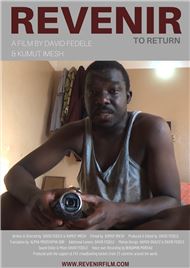To Return (Revenir)
Film und Gespräch
Der heute in Frankreich lebende Kumut Imesh möchte noch einmal seine Fluchtroute nachverfolgen, die vom Bürgerkrieg an der Elfenbeinküste über den Niger und Marokko bis ans Mittelmeer reichte – dieses Mal allerdings mit der Kamera in der Hand.
Borderline Europe e.V, trixiewiz e.V. und OASE Berlin e.V. laden in Zusammenarbeit mit der FilmInitiative Köln e.V. zur Vorführung des Films "To Return" und anschließender Diskussion mit den Regisseur David Fedele und Co- Regisseur Kumut Imesh ein.
Der Film wurde von FilmInitiative Köln e.V. für den Fokus „Innerafrikanische Migration“ des 16. Kölner Afrika Film Festival (13. – 23.9.2018) ausgewählt und Deutsch untertitelt - gefördert im Fonds TURN der Kulturstiftung des Bundes.
Die Einladung der Regisseur*innen wurde im Rahmen eine Kooperation mit den Vereine trixiewiz e.V., Borderline Europe e.V. und OASE Berlin e.V. ermöglicht.
Im Anschluss an den Film laden wir zur Diskussion mit den Filmemachern und Andrea Stäritz von Borderline Europe e.V. über die aktuelle Situation an der EU Außengrenze in Nordafrika ein.
Die Diskussion moderieren Teresita Cannella (trixiewiz e.V) und Jochen Schwarz (Flüchtlingsrat Berlin / OASE Berlin e.V).

____________
Kumut Imesh – co-director / camera / protagonist
Originally from the Ivory Coast in West Africa, Kumut was forced to flee civil war in his country in 2004. Seeking a peaceful and safe place to live, he began the long journey across the African continent before finally arriving in Morocco, where he spent 7 years. While in Morocco he worked closely with NGOs and associations working closely with other migrants, providing support and assistance.
In 2013 he met the film director David Fedele in Morocco, and he worked as the translator for the film The Land Between. During this time, Kumut developed a very keen interest in documentary filmmaking, especially the potential to tell stories from an African perspective, and the original idea to make a film retracing his journey across Africa was born.
In 2014 Kumut arrived in Europe, and was granted asylum. He currently lives as a refugee with his wife and small child in France, working as a webmaster. He is also the founder and president of ACSORE (Actions of Solidarity for Refugees), an association in France that works for the social and educational integration of asylum seekers and refugees.
REVENIR is Kumut’s first film.
Plot: For years, the stories of West African migrants and refugees have been told through the lenses of foreign journalists. Now there is a story from the inside. Part road-trip, part memoir, part journalistic investigation, REVENIR follows Kumut Imesh, a refugee from the Ivory Coast now living in France, as he returns to the African continent and attempts to retrace the same journey that he himself took when forced to flee civil war in his country … But this time with a camera in his hand. Traveling alone, Kumut will be documenting his own journey; both as the main protagonist in front of the camera, as well as the person behind it, revealing the human struggle for freedom and dignity on one of the most dangerous migratory routes in the world. A controversial film experiment, a courageous journey and a unique collaboration between filmmaker and refugee; which is not without consequences. ______________ Pendant des années, les récits des migrants d’Afrique de l’Ouest et des réfugiés ont été racontés à travers les yeux de journalistes étrangers. Maintenant, il y a une histoire racontée de l’intérieur. À la fois un road-trip, une autobiographie et une enquête journalistique, REVENIR suit Kumut Imesh, un réfugié de la Côte d’Ivoire habitant maintenant en France, qui retourne sur le continent africain pour y tenter de retracer le chemin qu’il prit lorsqu’il dû fuir la guerre civile de son pays… Mais cette fois, il le fait avec une caméra à la main. Voyageant seul, Kumut documentera son propre voyage sous deux angles : celui du personnage principal devant la caméra, ainsi que celui de la personne derrière la caméra, montrant l’aspiration humaine à la liberté et à la dignité sur une des routes migratoires les plus dangereuses au monde. Un projet de film controversé, un voyage plein de courage et une collaboration unique entre cinéaste et réfugié qui n’est pas sans conséquences.

